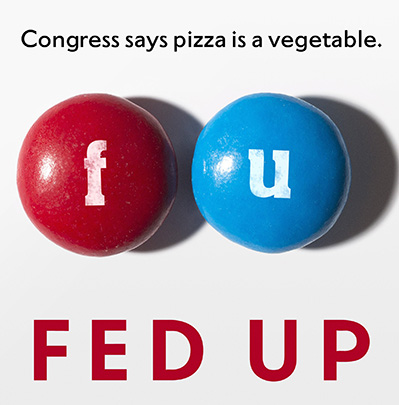Fed Up with Sugar
 I was lucky enough to catch a screening of Fed Up when it was in theaters and was pleased to see that the film specifically targets sugar and the industries that profit from adding sugar to processed food and beverages. In public health circles, I’ve heard that sentiment echoed quite often: focusing on sugar is the key to many of our public health problems and is the new tobacco in terms of the enormity of the threat to public health.
I was lucky enough to catch a screening of Fed Up when it was in theaters and was pleased to see that the film specifically targets sugar and the industries that profit from adding sugar to processed food and beverages. In public health circles, I’ve heard that sentiment echoed quite often: focusing on sugar is the key to many of our public health problems and is the new tobacco in terms of the enormity of the threat to public health.
As I mentioned in an earlier blogpost, Fed Up is the end-result of Katie Couric’s and Laurie David’s quest to make a film that explores the obesity and type II diabetes epidemics. The USA Today story I cited damns the federal food policies that subsidize cheap corn syrup, a major source of fructose in the standard American diet, or SAD, which seems an appropriate acronym. High fructose corn syrup (HFCS) is a slightly different compound than sucrose, or table sugar. Where sucrose is equal parts glucose and fructose, HFCS is composed of about 55 percent fructose, about 40 percent glucose, and about 5 percent galactose. This combination turns out to be more toxic to the liver than sucrose is. The liver is the only organ of the body capable of metabolizing fructose, whereas glucose can be metabolized by muscle cells, converted to fat and stored in fat cells, and stored in muscle and the liver as glycogen. When confronted by the high fructose load present in any beverage sweetened by HFCS—also used in most processed food—the liver converts the fructose to fat, which is stored in liver cells or hepatocytes. This can lead to fatty liver or steatosis in children and adults who consume large amounts of HFCS in sodas, cereals, or processed foods. The incidence of non-alcoholic steatohepatitis or NASH is increasing in parallel with the epidemic of metabolic syndrome, obesity, and type II diabetes – all conditions made worse by diets high in sugar, especially high fructose corn syrup, and high in refined carbohydrates. And one doesn’t have to be obese to show these changes in the liver. Unchecked, these changes evolve to NASH and, ultimately, cirrhosis. (For more information about HFCS, check out this article from Science News.)
As Fed Up makes clear, we all need to be more careful about consuming products sweetened with HFCS, especially sugar-sweetened beverages such as soda, fruit drinks, and “Vitamin Water.” This vigilance needs to take place at home, but more especially at the institutions we entrust with our health and safety: schools, the military, hospitals, and prisons. Asking parents to bear the entire responsibility of restricting sugar in their children’s diets is tasking them with an unfairly large burden. Parents and caretakers need to be supported by schools that don’t allow soda, snack foods, energy drinks, granola bars or other thinly veiled sugar-delivery systems to be sold on premises, for example. Our soldiers need to be supported with healthy meals low in sugars. Our civil servants need to be able to purchase the same healthy, low-sugar meals in their cafeterias. And so on.
But to provide institutional support for the individuals who are currently bearing all the burden of providing healthy food, we need to take on the policies and the policymakers who want to sustain the current system that props up the industries profiting from selling us sugar. Our First Lady Michelle Obama is one such hero who refuses to back down in the school-lunch fight. Who will be next? Who will fight the good public health fight and take on those who profit from corn syrup?